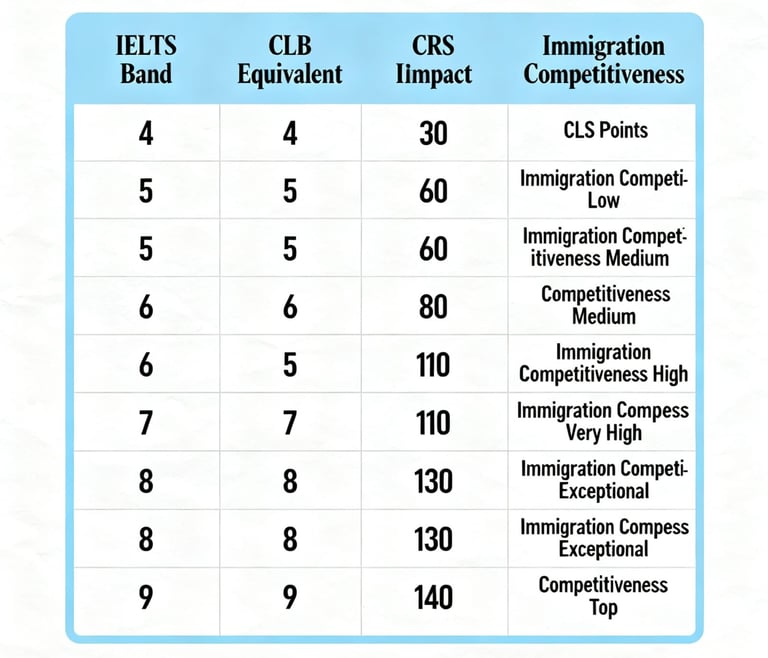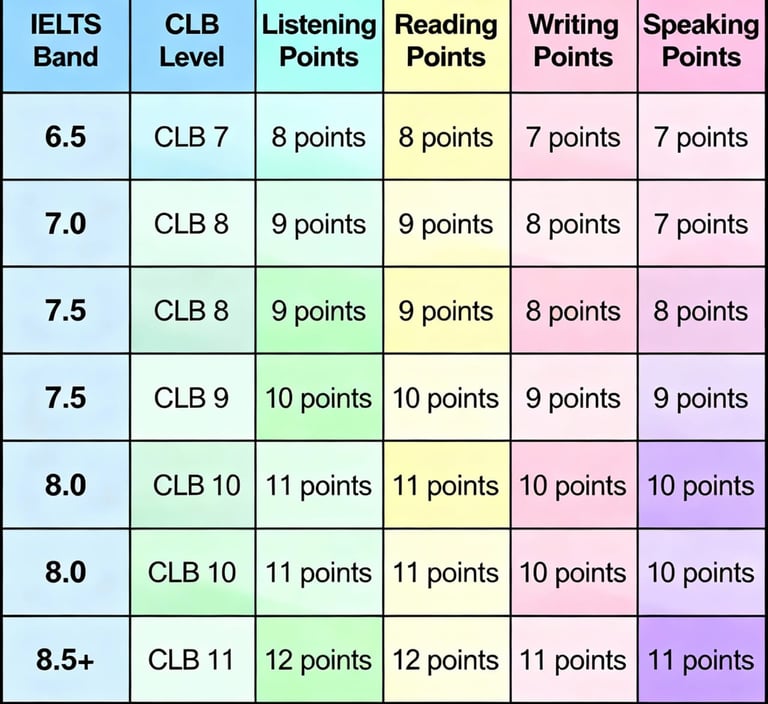Achieving IELTS Band 8+: Your Comprehensive Guide to Success
Breaking through the IELTS Band 6.5-7 plateau represents one of the most challenging yet crucial milestones in your Canadian immigration journey. With Express Entry becoming increasingly competitive and Provincial Nominee Programs demanding higher language scores, achieving IELTS Band 8+ has transformed from a nice-to-have into an absolute necessity for immigration success.
swati
10/8/202512 min read


IELTS Band 8+ Achievement Guide: From Band 6.5 to Immigration Success in 8 Weeks
Breaking through the IELTS Band 6.5-7 plateau represents one of the most challenging yet crucial milestones in your Canadian immigration journey. With Express Entry becoming increasingly competitive and Provincial Nominee Programs demanding higher language scores, achieving IELTS Band 8+ has transformed from a nice-to-have into an absolute necessity for immigration success.
After coaching over 27,000 students to their target scores with a 95% success rate, this comprehensive 8-week transformation guide reveals the proven strategies that elevate intermediate IELTS performers to Band 8+ achievers. Whether you're stuck at Band 6.5 and struggling to break through, or consistently scoring Band 7 but need that extra push for competitive immigration scores, this systematic approach will position you for IELTS excellence and Canadian immigration success
The Band 6.5-7 Plateau: Understanding the Challenge
Why Students Get Stuck at Intermediate Levels
The journey from Band 6.5 to Band 8+ isn't simply about studying harder—it requires fundamentally different strategies that address the sophisticated language use and cultural understanding expected at advanced levels.
Common Plateau Characteristics:
Adequate vocabulary but limited sophisticated expression
Generally correct grammar with persistent intermediate errors
Clear communication that lacks precision and nuance
Understanding of content without demonstrating analytical depth
Comfortable with familiar topics but struggling with complex subjects
The Immigration Stakes at Band 8+:


The Canadian Immigration Context
Express Entry Requirements:
Minimum: CLB 7 (IELTS 6.0-7.0 depending on section)
Competitive: CLB 9+ (IELTS 7.0-8.0+ across sections)
Maximum Points: CLB 10+ (IELTS 8.0+ consistently)
Provincial Nominee Program Preferences:
Ontario PNP: Strong preference for CLB 9+ candidates
British Columbia PNP: CLB 8+ significantly improves selection chances
Alberta PNP: Higher language scores compensate for other factors
Week 1-2: Foundation Strengthening and Error Analysis
Comprehensive Diagnostic Assessment
Before beginning intensive preparation, conduct a thorough analysis of your current performance across all four sections.
Self-Assessment Framework:
Listening Analysis:
Note-taking effectiveness during recordings
Ability to follow complex academic lectures
Understanding of various English accents
Prediction and inference skill level
Time management during different question types
Reading Analysis:
Reading speed vs. comprehension balance
Vocabulary range in academic contexts
Ability to identify implicit meanings
Skimming and scanning efficiency
Question-type specific strategies
Writing Analysis:
Task Achievement: Fully addressing all parts of questions
Coherence and Cohesion: Logical organization and flow
Lexical Resource: Vocabulary range and accuracy
Grammatical Range and Accuracy: Complex structure usage
Speaking Analysis:
Fluency and Coherence: Natural flow and logical organization
Lexical Resource: Vocabulary precision and variety
Grammatical Range and Accuracy: Complex structure control
Pronunciation: Clarity and natural rhythm
Grammar Accuracy Improvement Techniques
Week 1 Focus: Eliminating Persistent Errors
Common Band 6.5-7 Grammar Issues:
1. Article Usage: The/a/an precision in academic contexts
2. Conditional Structures: Mixed conditionals and hypothetical situations
3. Passive Voice: Appropriate academic register usage
4. Complex Tenses: Perfect aspects and future in the past
5. Relative Clauses: Reduced relatives and complex modifications
Daily Grammar Enhancement (30 minutes):
Day 1-2: Article Mastery
Study definite article rules for academic writing
Practice with IELTS Writing Task 1 data descriptions
Focus on countable/uncountable noun distinctions
Complete targeted exercises with immediate feedback
Day 3-4: Conditional Perfection
Master mixed conditionals for Speaking Part 3
Practice hypothetical situations for Writing Task 2
Develop sophisticated "what if" expressions
Apply conditionals in context-appropriate scenarios
Day 5-7: Complex Structure Integration
Combine multiple grammar points naturally
Practice academic writing with varied sentence structures
Develop speaking responses using advanced grammar
Review and correct errors from practice exercises
Academic Vocabulary Expansion Strategy
Week 2 Focus: Sophisticated Expression Development
Academic Word List Mastery:
Prioritize high-frequency academic vocabulary (570 word families)
Focus on word formation (prefixes, suffixes, roots)
Develop collocations and idiomatic expressions
Practice register-appropriate vocabulary choices
Daily Vocabulary Building (45 minutes):
Academic Vocabulary Categories:
1. Process and Analysis Words:
analyze, synthesize, evaluate, demonstrate, establish
subsequent, preceding, facilitate, constitute, comprise
furthermore, nevertheless, consequently, moreover
2. Opinion and Argumentation:
advocate, contend, assert, postulate, refute
substantial, significant, considerable, negligible
predominantly, invariably, consistently, fundamentally
3. Data and Research Terminology:
correlation, hypothesis, methodology, empirical, statistical
fluctuation, trajectory, proportion, distribution, trend
approximately, precisely, substantially, marginally
Vocabulary Integration Techniques:
Create academic sentence structures using new vocabulary
Practice paraphrasing with sophisticated alternatives
Develop topic-specific vocabulary banks for common IELTS themes
Use vocabulary in context during speaking practice
Time Management Skill Development
Strategic Timing for Each Section:
Listening (30 minutes + 10 minutes transfer):
Develop prediction strategies for each section
Practice note-taking systems for academic lectures
Master question scanning before audio begins
Build concentration stamina for 30-minute duration
Reading (60 minutes for 3 passages):
Allocate 18-20 minutes per passage maximum
Develop efficient skimming (2-3 minutes per passage)
Practice strategic question ordering for efficiency
Build scanning speed for specific information
Writing (60 minutes total):
Task 1: 18-20 minutes (150+ words)
Task 2: 38-40 minutes (250+ words)
Planning: 5 minutes combined for both tasks
Review: 2-3 minutes for error checking
Speaking (11-14 minutes):
Part 1: Natural, relaxed responses (4-5 minutes)
Part 2: Structured preparation and delivery (3-4 minutes)
Part 3: Sophisticated discussion skills (4-5 minutes)
Week 3-4: Module-Specific Mastery Techniques
Listening: Advanced Note-Taking and Prediction Systems
The PREP-N System for Academic Listening:
Predict content from question analysis
Record key information using symbols and abbreviations
Evaluate information relevance during listening
Paraphrase answers using question language
Note-taking optimization for concentration
Advanced Note-Taking Symbols:
↑ (increase/improve/rise)
↓ (decrease/decline/fall)
= (equal/same/similar)
≠ (different/opposite/unlike)
→ (leads to/causes/results in)
← (comes from/due to/because of)
o (positive/advantage/benefit)
o (negative/disadvantage/problem)
Section-Specific Strategies:
Section 1 (Everyday Social Context):
Focus on spelling accuracy for proper nouns
Listen for number and date format variations
Anticipate question sequence logic
Practice with various English accents (British, Australian, American)
Section 2 (Social Context Monologue):
Map information spatially when relevant
Identify speaker emphasis and stress patterns
Follow logical information sequence
Practice with facility descriptions and event explanations
Section 3 (Educational/Training Context):
Track multiple speaker interactions
Identify agreement/disagreement patterns
Note academic vocabulary in context
Follow discussion development and conclusions
Section 4 (Academic Lecture):
Create abbreviated outline structure
Identify main ideas vs. supporting details
Track cause-effect relationships
Practice with authentic university lecture content
Reading: Strategic Question Approaches and Speed Enhancement
The POWER Reading Method:
Preview passage structure and question types
Organize question approach strategically
Work systematically through targeted questions
Evaluate answers for logical consistency
Review flagged questions with remaining time
Question Type Optimization:
Multiple Choice Questions:
Eliminate obviously incorrect options first
Look for paraphrasing rather than exact matches
Consider question context within passage themes
Use elimination process for 50/50 choices
True/False/Not Given:
Focus on specific claims rather than general ideas
Distinguish between "False" (contradicted) and "Not Given" (unstated)
Look for qualifying words (some, all, never, always)
Base answers only on passage information
Matching Headings:
Identify main idea vs. supporting details in paragraphs
Look for topic sentences and concluding statements
Consider paragraph function within overall passage
Use process of elimination with remaining options.
Sentence Completion:
Predict answer type (noun, verb, adjective, number)
Look for grammatical clues in incomplete sentences
Maintain original passage meaning and register
Check word limit requirements carefully
Speed Reading Development:
Practice chunking (reading phrases rather than individual words)
Develop peripheral vision for faster text processing
Reduce subvocalization through concentration exercises
Build reading stamina with extended practice sessions
Writing: Task Achievement and Sophisticated Expression
Week 3 Focus: Task 1 Mastery (Academic)
Data Description Excellence:
Overview Writing Template:
"The [chart/graph/table] illustrates [general trend/comparison] regarding [topic] over [time period/categories]. Overall, it is evident that [most significant trend] while [secondary observation]."
Advanced Data Language:
Trends and Changes:
Dramatic: surge, plummet, soar, plunge, rocket
Moderate: climb, dip, edge up, slip, inch higher
Gradual: creep up, ease down, drift upward, slide downward
Stability: plateau, level off, remain constant, stabilize
Comparisons and Contrasts:
Superiority: substantially higher, considerably greater, markedly superior
Similarity: comparable levels, similar proportions, equivalent figures
Difference: stark contrast, notable disparity, significant gap
Task 1 Structure Optimization:
1. Introduction (1 sentence): Paraphrase the question
2. Overview (2 sentences): Main trends and striking features
3. Body Paragraph 1 (3-4 sentences): Detailed analysis of major trends
4. Body Paragraph 2 (3-4 sentences): Supporting details and comparisons
Week 4 Focus: Task 2 Advanced Argumentation
Essay Structure Enhancement:
Introduction Formula:
Hook: Thought-provoking statement or rhetorical question
Background: Context and issue explanation (1-2 sentences)
Thesis: Clear position with essay roadmap
Body Paragraph Development:
Topic Sentence: Clear main idea introduction
Explanation: Detailed reasoning and elaboration
Example: Specific, relevant illustration
Link: Connection to thesis and transition to next point
Sophisticated Argument Language:
Presenting Evidence:
"Research consistently demonstrates that..."
"Empirical evidence suggests..."
"Studies have conclusively shown..."
"Data indicates a strong correlation between..."
Qualifying Statements:
"While this may be true to some extent..."
"Although there are valid counterarguments..."
"Despite certain limitations..."
"Notwithstanding these considerations..."
Cause and Effect Relationships:
"This phenomenon can be attributed to..."
"The underlying factors include..."
"Consequently, this leads to..."
"The ramifications of this trend are..."
Speaking: Fluency Development and Sophisticated Response Construction
Part 1: Natural Conversation Optimization
Develop extended responses (3-4 sentences per question)
Practice smooth topic transitions
Use sophisticated vocabulary naturally
Maintain conversational tone while demonstrating language range
Sample Part 1 Enhancement:
Question: "Do you enjoy cooking?"
Band 6.5 Response: "Yes, I like cooking. I cook for my family sometimes. It's relaxing and I can make healthy food."
Band 8+ Response: "Absolutely! I find cooking incredibly therapeutic after a demanding day at work. While I particularly enjoy experimenting with international cuisines, I've recently been focusing on developing my skills with traditional recipes from my grandmother. The creative process of combining flavors and the satisfaction of preparing nutritious meals for my family makes it one of my favorite pastimes."
Part 2: Structured Storytelling Mastery
The STAR+ Framework:
Situation: Context establishment with vivid details
Task: Challenge or objective identification
Action: Detailed explanation of steps taken
Result: Outcome and impact description
+Plus: Reflection and broader significance
Advanced Narrative Techniques:
Use varied tenses for time relationships
Incorporate descriptive language for engagement
Include emotional responses and personal growth
Connect experiences to broader themes
Part 3: Abstract Discussion Excellence
Sophisticated Response Structure:
1. Direct Answer: Clear position statement
2. Elaboration: Detailed reasoning and explanation
3. Example: Specific illustration or evidence
4. Extension: Broader implications or future considerations
Advanced Discussion Language:
Expressing Opinions:
"From my perspective..."
"I'm inclined to believe that..."
"It strikes me that..."
"I would argue that..."
Considering Alternatives:
"On the flip side..."
"Alternatively, one could argue..."
"Taking a different angle..."
"From another standpoint..."
Future Speculation:
"Looking ahead, I anticipate..."
"In the coming years, we're likely to see..."
"Future developments may well include..."
"The trajectory suggests that..."
Week 5-6: Advanced Techniques and Cultural Understanding
Sophisticated Language Use for Band 8+ Performance
Advanced Grammar Integration:
Complex Sentence Structures:
Mixed conditionals: "If I had studied abroad earlier, I would be working internationally now."
Reduced relative clauses: "The research conducted by the university demonstrates..."
Inversion for emphasis: "Not only does this approach improve efficiency, but it also reduces costs."
Cleft sentences: "What really concerns me is the environmental impact."
Academic Register Mastery:
Nominalisation: "The implementation of new policies" vs. "When new policies are implemented"
Hedging language: "It would appear that..." "There seems to be evidence suggesting..."
Impersonal constructions: "It is widely acknowledged that..." "There is a consensus that..."
Cultural Context and Critical Thinking
Canadian Immigration Context Integration:
Understanding Canadian Workplace Culture:
Collaborative decision-making processes
Work-life balance priorities
Diversity and inclusion emphasis
Environmental sustainability awareness
Professional development importance
Incorporating Canadian Examples:
Reference Canadian cities, provinces, and institutions naturally
Discuss Canadian social issues and policies appropriately
Demonstrate understanding of Canadian values and perspectives
Show awareness of Canadian economic and social trends
Critical Thinking Development:
Analytical Frameworks:
Cause and effect analysis
Comparative evaluation
Problem-solution development
Advantage-disadvantage assessment
Future trend prediction
Question Analysis Techniques:
Identify key terms and concepts
Consider multiple perspectives on issues
Evaluate evidence quality and relevance
Distinguish between fact and opinion
Recognize underlying assumptions
Error Pattern Recognition and Elimination
Common Band 7-8 Barriers:
Writing Errors:
Repetitive vocabulary and sentence structures
Inappropriate register mixing
Unclear pronoun references
Logical connection weaknesses
Conclusion inadequacy
Speaking Hesitations:
Filler word overuse ("um," "like," "you know")
Repetitive phrase patterns
Limited idiomatic expression
Pronunciation inconsistencies
Stress pattern errors
Self-Correction Strategies:
Record and analyze speaking practice sessions
Develop personal error checklist for writing
Practice immediate self-correction during speaking
Use paraphrasing when vocabulary fails
Maintain fluency over accuracy when appropriate
Week 7-8: Test Simulation and Performance Optimization
Full-Length Practice Test Strategy
Weekly Test Schedule:
Week 7: Two complete practice tests with detailed analysis
Week 8: One practice test + focused improvement sessions
Test Conditions Simulation:
Use official IELTS practice materials exclusively
Maintain exact timing for each section
Complete all sections in order without extended breaks
Review using official band descriptors
Identify specific improvement areas
Performance Analysis Framework:
Listening Analysis:
Question type accuracy patterns
Accent-specific performance variations
Concentration maintenance throughout sections
Note-taking effectiveness evaluation
Time management optimization needs
Reading Analysis:
Passage type performance comparison
Question type accuracy patterns
Speed vs. accuracy balance assessment
Vocabulary gap identification
Strategic approach effectiveness
Writing Analysis:
Task Achievement: Complete prompt addressing
Coherence and Cohesion: Logical flow and connection
Lexical Resource: Vocabulary range and precision
Grammatical Range and Accuracy: Complex structure control
Speaking Analysis:
Fluency and Coherence: Natural flow and organization
Lexical Resource: Vocabulary sophistication and accuracy
Grammatical Range and Accuracy: Complex structure usage
Pronunciation: Clarity and natural rhythm
Confidence Building and Test-Day Preparation
Mental Preparation Strategies:
Visualization Techniques:
Mentally rehearse successful test performance
Visualize confident responses to challenging questions
Practice calm responses to unexpected situations
Imagine achieving target band scores
Stress Management:
Develop breathing techniques for anxiety control
Practice positive self-talk during difficult moments
Build physical stamina for 3-hour test duration
Create backup strategies for challenging questions
Test-Day Logistics:
Familiarize yourself with test center location and layout
Prepare required identification and materials
Plan arrival time with buffer for unexpected delays
Organize post-test reflection and next steps
Final Week Optimization
Day-by-Day Focus:
Days 1-2: Speaking Intensive
Complete Part 1, 2, and 3 practice sessions
Record responses for fluency and accuracy analysis
Practice with unfamiliar topics and abstract concepts
Refine pronunciation and intonation patterns
Days 3-4: Writing Mastery
Complete Task 1 and Task 2 under test conditions
Focus on sophisticated vocabulary integration
Practice complex grammar structures naturally
Refine time management and review strategies
Day 7: Rest and Mental Preparation
Light review of key strategies only
Relaxation and confidence building activities
Final logistics confirmation
Early rest for optimal test-day performance
Canadian Immigration Score Impact Analysis
Days 5-6: Listening and Reading Final Tuning
Complete section-specific practice with difficult materials
Refine note-taking and strategic approaches
Practice with various accent types and speeds
Optimize reading speed without compromising accuracy
Express Entry CRS Point Optimization
Language Score Maximization Strategy:


Total CRS Language Points:
Band 6.5-7.0 Average: 74-96 points
Band 7.5-8.0 Average: 108-130 points
Band 8.0+ Consistent: 130-136 points
Provincial Nominee Program Advantages
Ontario PNP (OINP) Preferences:
Human Capital Priorities: Band 7.0+ preferred, Band 8.0+ highly competitive
French-Speaking Skilled Worker: Band 7.0+ English requirement
Express Entry streams: Higher language scores compensate for lower CRS
British Columbia PNP (BC PNP) Requirements:
Skills Immigration: Band 7.0+ required for most NOCs
Tech Pilot: Band 7.0+ mandatory with strong preference for Band 8.0+
Express Entry BC: Higher language scores improve ranking significantly
Professional Registration Benefits
Regulated Professions:
Engineering (PEO): Band 7.0+ typically required
Healthcare (CNO, etc.): Band 7.0-8.0+ depending on profession
Accounting (CPA): Band 7.0+ for certification recognition
Teaching (OCT): Band 8.0+ often preferred
Career Advancement:
Management positions: Band 8.0+ demonstrates communication competency
Client-facing roles: High IELTS scores indicate professional communication ability
International assignments: Band 8.0+ shows global communication readiness
Success Stories: Real Transformation Examples
Case Study 1: Rajesh's 8-Week Journey
Background:
Software engineer from Mumbai
Initial IELTS: Overall 6.5 (L:7.0, R:6.5, W:6.0, S:6.5)
Target: Band 8.0+ for Express Entry competitiveness
Week 1-2 Focus:
Grammar improvement: Article usage and conditional structures
Academic vocabulary: Technology and business terminology
Time management: Reading speed enhancement
Week 3-4 Strategies:
Writing Task 2: Argument structure and sophisticated language
Speaking Part 3: Abstract discussion skills
Listening: Note-taking system optimization
Week 5-6 Advanced Techniques:
Cultural context integration
Complex grammar structures
Error pattern elimination
Week 7-8 Performance Optimization:
Three full practice tests
Targeted improvement sessions
Test-day preparation
Results:
Final IELTS: Overall 8.0 (L:8.5, R:8.0, W:7.5, S:8.0)
Express Entry ITA: Received within 6 weeks
Immigration timeline: 12 months total
Case Study 2: Priya's Professional Advancement
Background:
Marketing manager from Delhi
Initial IELTS: Overall 7.0 (L:7.5, R:7.0, W:6.5, S:7.0)
Target: Band 8.5+ for competitive Ontario PNP application
Preparation Strategy:
Intensive writing improvement with advanced argumentation
Speaking fluency enhancement with Canadian context integration
Reading speed optimization for time management
Listening accuracy improvement with various accents
Results:
Final IELTS: Overall 8.5 (L:8.5, R:8.5, W:8.0, S:8.5)
Ontario PNP nomination: Received priority processing
Career advancement: Promoted to senior management role
Key Success Factors:
Consistent daily practice (2 hours minimum)
Professional coaching for personalized feedback
Canadian context integration throughout preparation
Systematic error correction and improvement tracking
Professional Coaching Impact and ROI Analysis
LinguoPrep Success Statistics
Band Improvement Data (8-week program):
Students starting at Band 6.5: 94% achieve Band 7.5+
Students starting at Band 7.0: 91% achieve Band 8.0+
Average improvement: 1.5 bands overall score
Target achievement rate: 95% success rate
Coaching Benefits:
Personalized error analysis and correction strategies
Canadian cultural context training for appropriate responses
Advanced template customization for sophisticated expression
Mock test evaluation using official IELTS criteria
Investment Return Analysis:
Coaching investment: CAD $800-$2,000
Immigration timeline acceleration: 6-12 months faster
Higher CRS scores: Additional 20-40 Express Entry points
Career advancement: Immediate professional credibility improvement
DIY vs. Professional Preparation Comparison
Self-Study Limitations:
Limited feedback on speaking and writing performance
Difficulty identifying personal error patterns
Lack of cultural context guidance
Inconsistent motivation and progress tracking
Professional Coaching Advantages:
Expert evaluation and targeted improvement strategies
Canadian immigration context specialization
Accountability and structured progress monitoring
Advanced techniques for sophisticated language use
Your 8-Week Action Plan: Implementation Guide
Week-by-Week Implementation Checklist
Preparation Phase (Before Week 1):
[ ] Complete diagnostic IELTS practice test
[ ] Identify current band scores for each section
[ ] Set specific target scores for immigration goals
[ ] Gather official IELTS preparation materials
[ ] Establish daily study schedule (2-3 hours minimum)
Week 1-2 Foundation:
[ ] Complete grammar diagnostic and improvement plan
[ ] Begin academic vocabulary building (50 words/week)
[ ] Practice time management strategies for each section
[ ] Complete 2 listening and 2 reading practice sessions
[ ] Write 2 Task 1 and 2 Task 2 essays
Week 3-4 Module Mastery:
[ ] Master advanced note-taking for listening
[ ] Optimize reading strategies for speed and accuracy
[ ] Develop sophisticated writing templates
[ ] Practice speaking with advanced response structures
[ ] Complete first full practice test
Week 5-6 Advanced Techniques:
[ ] Integrate complex grammar structures naturally
[ ] Develop cultural context understanding
[ ] Eliminate persistent error patterns
[ ] Practice abstract reasoning and critical thinking
[ ] Complete second full practice test
Week 7-8 Performance Optimization:
[ ] Complete final practice test under exam conditions
[ ] Refine test-day strategies and timing
[ ] Build confidence through consistent performance
[ ] Prepare logistics for official test
[ ] Mental preparation and stress management
Daily Study Schedule Template
Morning Session (60-90 minutes):
Grammar review and practice (20 minutes)
Academic vocabulary building (15 minutes)
Section-specific skill practice (45-60 minutes)
Evening Session (60-90 minutes):
Writing practice and review (45 minutes)
Speaking practice with recording (30 minutes)
Error analysis and improvement planning (15 minutes)
Weekend Intensive (3-4 hours):
Full practice test or comprehensive section practice
Detailed performance analysis
Improvement strategy adjustment
Cultural context and critical thinking development
Achieving IELTS Band 8+ represents more than test success—it demonstrates your readiness to thrive in Canadian academic, professional, and social environments. This systematic 8-week approach transforms intermediate English skills into sophisticated communication abilities that open doors to competitive immigration scores and professional opportunities.
Conclusion: Your Path to IELTS Band 8+ Success
Key Success Principles:
Systematic approach to skill development
Integration of Canadian cultural context
Consistent practice with official materials
Regular performance monitoring and adjustment
Professional guidance for optimal results
The Immigration Impact:
Express Entry competitiveness
Provincial Nominee Program advantages
Professional registration facilitation
Career advancement opportunities
Long-term settlement success
Ready to break through your IELTS plateau and achieve the Band 8+ scores that transform your Canadian immigration timeline? Professional guidance can accelerate your progress and ensure systematic improvement across all four sections.
Ready to Achieve IELTS Band 8+ and Accelerate Your Canadian Immigration?
Book your FREE IELTS Assessment today and receive a personalized 8-week improvement strategy worth ₹5,000. Join the 27,000+ students who have broken through their plateaus and achieved their Canadian immigration dreams with LinguoPrep's proven methodology.
Address:
492-A, Near Krishna Mandir, Model Town Extension, Ludhiana, Punjab.
Contacts
+1 800 9170 389
info@linguoprep.com
Subscribe to our newsletter


